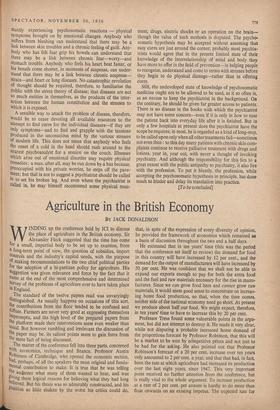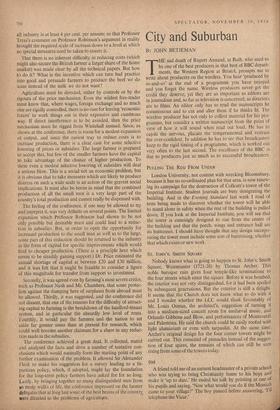Agriculture in the British Economy
BY JACK DONALDSON INDING up the conference held by ICI to discuss the place of agriculture in the British economy, Sir Alexander Fleck suggested that the time has come for a small, impartial body to be set up to examine, from a long-term point of view, the question of subsidies, import Controls and the industry's capital needs, with the purpose of making recommendations to the two chief political parties for the adoption of a bi-partisan policy for agriculture. His suggestion was given relevance and force by the fact that it came at the end of the most comprehensive and determined survey of the problems of agriculture ever to have taken place in England.
The standard of the twelve papers read was unvaryingly distinguished. As usually happens on occasions of this sort, the contributions from the floor tended to be confused and diffuse. Farmers are never very good at expressing themselves impromptu, and the high level of the prepared papers from the platform made their interventions seem even weaker than usual. But however rambling and irrelevant the discussion of the paper may be, its salient points seem to gain force from the mere fact of being discussed. The matter of the conference fell into three parts, concerned with economics, technique and finance. Professor Austin Kobinson of Cambridge, who opened the economic section, had. erhaps, of all the speakers the most original and funda- Mentapl contribution to make. It is true that he was telling the audience what many of them wanted to hear, and was giving them logical reasons for believing what they had long believed. But his thesis was so admirably constructed, and his Position so little shaken by the worst his critics could do, that, in spite of the expression of every diversity of opinion, he provided the framework of economics which remained as a basis of discussion throughout the two and a half days.
He estimated that in ten years' time (this was the period that the conference set itself to review) the demand for food in this country will have increased by 12 per cent., and the demand for the output of manufacturers will have increased by 50 per cent. He was confident that we shall not be able to expand our exports enough to pay for both the extra food and the fuel and raw materials necessary for the rise in manu- factures. Since we can grow food here and cannot grow raw materials, it would seem good sense to concentrate on increas- ing home food production, so that, when the time comes, neither side of the national economy need go short. At present we produce about half our food. We might expect, therefore, in ten years' time to have to increase this by 20 per cent.
Professor Tress found some vulnerable points in the argu- ment, but did not attempt to destroy it. He made it very clear, while not disputing a probable increased home demand of the proportions forecast by Professor Robinson, that this will be a market to be won by competitive prices and not just to be had for the asking. He also pointed out that Professor Robinson's forecast of a 20 per cent. increase over ten years only amounted to 2 per cent. a year, and that that had, in fact, been the rate at which agriculture had increased its production over the last eight years, since 1947. This very important point received no further attention from the conference, but is really vital to the whole argument. To increase production at a rate of 2 per cent. per annum is hardly to do more than float onwards on an existing impetus. The expected rate for all industry is at least 4 per cent. per annum; so that Professor Tress's comment on Professor Robinson's argument in reality brought the required scale of increase down to a level at which no special measures need be taken to ensure it.
That there is no inherent difficulty in reducing costs (which might also secure the British farmer a larger share of the home market) was made clear by all the technical papers. But how to do it? What is the incentive which can turn bad practice into good and persuade farmers to produce the beef we do want instead of the milk we do not want?
Agriculture must be directed, either by controls or by the rigours of the price mechanism. Even the wildest free-trader must know that, where wages, foreign exchange and so much else are rigidly controlled, there is no case for leaving `economic forces' to work things out in their expensive and cumbrous way. If direct interference is to be avoided, then the price mechanism must be rigged from Whitehall instead. Since, as shown at the conference, there is room for a modest expansion of output, and since the easiest way to reduce costs is to increase production, there is a clear case for some selective lowering of prices or subsidies. The large farmer is prepared to accept this, but few of the smaller farmers have the capital to take advantage of the chance of higher production. To these even a modest selective lowering of subsidies will deal a serious blow. This is a social not an economic problem, but it is obvious that to take measures which are likely to produce distress on such a wide scale is an action of the gravest social implications. It must also be borne in mind that the combined production of all the small men' is a very large part of the country's total production and cannot really be dispensed with.
The feeling of the conference, if one may be allowed to try and interpret it, was very definite on several points. The limited expansion which Professor Robinson had shown to be not only possible but desirable must and could lead to a reduc- tion in subsidies. But, in order to open the opportunity for increased production to the small man as well as to the large, some part of this reduction should be returned to the industry in the form of capital for specific improvements which would lead to cheaper production. (There is a principle here which seems to be steadily gaining support.) Dr. Price estimated the annual shortage of capital at between £20 and £30 million, and it was felt that it might be feasible to consider a figure of this magnitude for transfer from support to investment.
Secondly, it was agreed even by farming's most severe critics, such as Professor Nash and Mr. Chambers, that some protec- tion against the dumping here of surpluses from abroad must be allowed. Thirdly, it was suggested, and the conference did not dissent, that one of the reasons for the difficulty of attract- ing capital to farming is the breakdown of the landlord-tenant system, and in particular the absurdly low level of rents. Fourthly, it would pay the farmers and the nation to set aside far greater sums than at present for research, which could well become another claimant for a share in any reduc- tion made in the subsidies.
The conference achieved a great deal. It collected, stated and analysed the facts and drew a number of tentative con- clusions which would naturally form the starting point of any further examination of the problem. It allowed Sir Alexander Fleck to make his suggestion for a survey leading to a bi- partisan policy, which, if, adopted, might lay the foundation for the long-term policy farmers have asked for for so long. Lastly, by bringing together so many distinguished men from so many walks of life, the conference impressed on the farmer delegates that at long last some of the best brains of the country, were directed to the problems of agriculttice.



















































 Previous page
Previous page